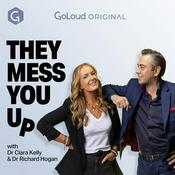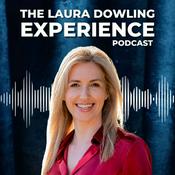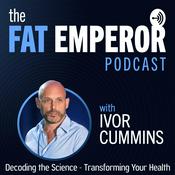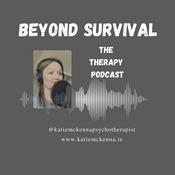123 episodes
- Wegovy Pill: Who's It For?
The new Wegovy pill is generating massive buzz — but is it actually better than the injection? Before you ask your doctor to switch, there are some surprising requirements that could make or break whether this option works for you.
This week on Fat Science, Dr. Emily Cooper, Mark Wright, and Andrea Taylor break down the new oral semaglutide approved for obesity treatment. They explain how the Wegovy pill differs from Rybelsus, who's a good candidate to switch (and who isn't), the strict dosing protocol most people don't know about, and what's coming next in the GLP-1 pill landscape — including a less fussy competitor from Eli Lilly.
Key Takeaways
The Wegovy pill uses an upgraded "version two" formulation with enhanced absorption — it's not the same as Rybelsus
Semaglutide targets deep metabolic dysfunction, not just appetite — reducing inflammation, visceral fat, and cardiovascular risk
The pill must be taken first thing in the morning on an empty stomach with minimal water, then nothing else for 30 minutes — breaking this protocol negates effectiveness
The pill is slightly less effective than the highest-dose Wegovy injection, so switching isn't ideal for patients still making progress at maximum dose
Novo Nordisk's cash pay program starts at $149/month for lower doses and $299/month for the highest dose
Eli Lilly's upcoming orforglipron pill uses small molecule technology that won't require the strict dosing ritual
Notable Quote
"When people say it works because it just makes you eat less, that's really missing the point of the sophistication of these meds." — Dr. Emily Cooper
Links & Resources
Podcast Home: fatsciencepodcast.com
Cooper Center for Metabolism: coopermetabolic.com
Resources from Dr. Cooper: coopermetabolic.com/resources
Join Our Community: patreon.com/cw/FatSciencePodcast
Submit Your Question: [email protected] or [email protected]
Fat Science is supported by the Diabesity Institute, a nonprofit dedicated to increasing access to effective, science-based metabolic care.
Disclaimer: This podcast is for informational purposes only and is not intended as medical advice. Please consult with a qualified healthcare provider for personalized recommendations. - What if the scale isn't moving, but your health is dramatically improving?
If you've ever felt discouraged because the number on the scale won't budge—even on a GLP-1 medication—this episode will change how you think about these drugs. Dr. Cooper breaks down the research showing that the biggest benefits have nothing to do with weight loss. It's all about metabolic health.
This Week on Fat Science
Dr. Emily Cooper, Mark Wright, and Andrea Taylor explore the research proving GLP-1 medications are far more than "weight loss drugs." The team explains how cardiovascular outcome trials revealed unexpected heart protection, why inflammation reduction may be the real mechanism behind these benefits, and what the latest FDA approvals for kidney disease, sleep apnea, and fatty liver mean for patients. Plus: the new oral Wegovy pill, what's coming next in metabolic medicine, and why everyone should be screened for metabolic dysfunction regardless of weight.
What You'll Learn
Why two-thirds of cardiovascular risk reduction from GLP-1s is completely independent of weight loss
How these medications reduce inflammation, stabilize arterial plaque, and improve vascular function
The difference between MASLD and MASH—and why the name change matters
What the Flow Trial revealed about kidney protection (and why it was stopped early)
How Zepbound earned FDA approval for sleep apnea
Why metabolic screening should happen regardless of what the scale says
Notable Quote
"You can still become incredibly healthier even if the weight is more stubborn. So I think that's the thing, is to discuss with your doctor not 'Oh, I want to lose X amount of pounds' or 'How much weight do you think I should lose?' That is not the conversation. It's more, let's take a look at the health parameters."
— Dr. Emily Cooper
Links & Resources
Podcast Home: fatsciencepodcast.com
Cooper Center for Metabolism: coopermetabolic.com
Resources from Dr. Cooper: coopermetabolic.com/resources
Submit Your Question: [email protected] or [email protected]
Fat Science is supported by the Diabesity Institute, a nonprofit dedicated to increasing access to effective, science-based metabolic care.
Disclaimer: This podcast is for informational purposes only and is not intended as medical advice. Please consult with a qualified healthcare provider for personalized recommendations. Mailbag: Food Tracking, Mechanical Eating Troubleshooting, COVID & Metabolism, and Metformin + GLP-1 Synergy
26/1/2026 | 41 mins.This week on Fat Science, Dr. Emily Cooper, Mark Wright, and Andrea Taylor answer listener mailbag questions from California, the UK, France, Washington, Wyoming, and beyond.
The team breaks down why Dr. Cooper does not recommend calorie tracking (and when limited tracking can make sense), how to build confidence in eating without data, and why “mechanical eating” sometimes needs medical customization—especially for people with slow gut transit or gastroparesis-like symptoms.
They also dig into bile acid malabsorption after gallbladder removal, when metformin side effects deserve a second look, what we currently know about COVID-19’s potential impact on metabolic health, and why metformin and GLP-1 medications can be complementary—particularly in PCOS.
Key Takeaways
• Long-term calorie tracking can override physiologic cues and reinforce diet mentality.
• Short-term, targeted tracking may be useful when guided by a clinician (e.g., nutrient deficiencies ).
• Obesity and abnormal appetite are both manifestations of metabolic dysfunction—not simple cause and effect.
• Mechanical eating is a framework, not a rigid rule—timing and food choices may need medical tailoring.
• Post-gallbladder diarrhea may reflect bile acid malabsorption and can be treatable.
• Metformin and GLP-1s often complement each other because they target different metabolic states (fasting vs fed).
Dr. Cooper’s Actionable Tips
• Stop daily calorie counting—focus on consistent patterns and metabolic nourishment.
• Use mechanical eating basics: eat every few hours, include all food groups, and reduce chemical additives when possible.
• If you’re transitioning away from tracking, consider a dietitian skilled in diet-mentality recovery.
• If frequent eating worsens sleep or bloating, work with a medical dietitian to adjust intervals and food types (especially with slow GI transit).
• If chronic diarrhea appears (especially after gallbladder removal), ask your clinician about bile acid malabsorption and treatment options.
• Use labs to guide therapy: fasting insulin can signal metformin benefit; post-meal patterns can point toward GLP-1 needs.
Notable Quote
“Once you start using tracking to stay in a calorie range or a carbohydrate range, you’re putting your brain in front of your physiologic intuition—your body is sending you important cues all the time.”
—Dr. Emily Cooper
Links & Resources
The Metabolic Links to PCOS, Release Date 2/24/25
The COVID Connection to Diabetes & Metabolic Health, Release Date 12/16/24
Podcast Home: https://fatsciencepodcast.com/
Episode References: https://fatsciencepodcast.com/wp-content/uploads/2025/06/Scientific-References-Fat-Science-Episodes.pdf
Cooper Center: https://coopermetabolic.com/podcast/
Resources from Dr. Cooper: https://coopermetabolic.com/resources/
Submit a Question: [email protected]
*Fat Science: No diets, no agendas—just science that makes you feel better. This podcast is for informational purposes only and is not intended to be medical advice.Mailbag: GLP-1 Weight Regain, Meals vs Snacks, and Why Some People Don’t Respond
19/1/2026 | 41 mins.his week on Fat Science, Dr. Emily Cooper, Mark Wright, and Andrea Taylor answer listener mailbag questions that get to the heart of metabolic health. The team explains the real difference between meals and snacks, discusses whether GLP-1 medications can be appropriate for children in complex cases, explores why some people appear to be “non-responders” to Wegovy, and breaks down why alarming headlines about rapid weight regain miss the bigger metabolic picture. They also explain how to set a goal weight using body composition, labs, and overall health—rather than the scale alone.
Key Questions Answered
• What separates a meal from a snack metabolically?
• Why can grazing all day backfire—even with healthy food?
• Are GLP-1s ever appropriate for kids?
• Why do some people feel hungrier as GLP-1 doses increase?
• How are PCOS and insulin dysregulation connected?
• What is a mixed meal tolerance test, and why does it matter?
• Do GLP-1 users really regain weight faster?
• How should goal weight be determined after major weight loss?
Key Takeaways
• Meals provide structure; snacks prevent long gaps—both matter.
• GLP-1 “non-response” often signals deeper metabolic issues.
• Weight regain reflects underlying dysfunction, not personal failure.
• Maintenance dosing must be individualized.
• Body composition matters more than BMI or scale weight.
Dr. Cooper’s Actionable Tips
• Eat structured meals with carbs, protein, and fats.
• Use snacks strategically to avoid long gaps.
• Ask about deeper glucose/insulin testing when progress stalls.
• Prioritize DEXA body composition over scale-based goals.
• Avoid compounded GLP-1s—especially in children.
Notable Quote
“If you stop treating the metabolic dysfunction, the dysfunction is still there—and the body will drive weight back to where it was headed all along.”
—Dr. Emily Cooper
Links & Resources
Podcast Home: https://fatsciencepodcast.com/
Episode References: https://fatsciencepodcast.com/wp-content/uploads/2025/06/Scientific-References-Fat-Science-Episodes.pdf
Cooper Center: https://coopermetabolic.com/podcast/
Resources from Dr. Cooper: https://coopermetabolic.com/resources/
Submit a Question: [email protected]
Fat Science: No diets, no agendas—just science that makes you feel better. This podcast is for informational purposes only and is not intended to be medical advice.- This week on Fat Science, Dr. Emily Cooper, Mark Wright, and Andrea Taylor break down two GLP-1 studies that challenge a major media myth: GLP-1 medications don’t drive weight loss just because people eat less. Instead, drugs like tirzepatide and semaglutide create direct metabolic shifts—including increased fat oxidation and improved fuel partitioning—regardless of appetite.
The team also explores mechanical eating, the psychological impact of “diet food,” and Andrea’s 13-year metabolic recovery journey.
Key Questions Answered
If both groups are dieting, why does the tirzepatide group lose more weight?
What is metabolic adaptation, and why does dieting slow metabolism so sharply?
How do GLP-1s directly increase fat oxidation?
What is mechanical eating, and why do GLP-1 users need it?
Why does ad-lib eating produce different metabolic responses than calorie restriction?
Can mindset alone change hunger hormones? (Yes—the milkshake study.)
Why do diet foods and diet sodas fail to improve metabolic health?
Why is response to GLP-1s so different from person to person?
Key Takeaways
GLP-1s are metabolic drugs—not appetite suppressants.
Their power comes from hormonal effects on fat burning, not reduced food intake.
Calorie restriction still slows metabolism.
Even on GLP-1s, dieting triggers significant metabolic slowdown.
Ad-lib eating outperforms dieting in the research.
Semaglutide users who ate freely did not show the extra metabolic slowdown seen in dieters.
Mechanical eating is the most durable long-term approach.
Regular meals and snacks protect lean mass and prevent famine signaling.
Mindset shapes hormones.
Believing a food is “diet” vs. “indulgent” alters ghrelin and satisfaction.
Track body composition—not just the scale.
DEXA scans show whether you’re losing fat, muscle, or bone.
Dr. Cooper’s Actionable Tips
Don’t diet on GLP-1s. Focus on fueling, not restriction.
Use mechanical eating: predictable meals and snacks, no long gaps.
Prioritize satisfaction: diet foods often backfire hormonally.
Follow your real-world data: long-term changes matter more than short-term scale shifts.
Ask about body composition testing if possible.
Notable Quote:
“What that study proved is that doing the calorie restriction is causing the metabolic slowing… and that’s why it’s so confusing to me that we keep advising people to restrict calories when they’re trying to improve their metabolic function.” —Dr. Emily Cooper
Links & Resources
Podcast Home: https://fatsciencepodcast.com/
Episode References: https://fatsciencepodcast.com/wp-content/uploads/2025/06/Scientific-References-Fat-Science-Episodes.pdf
Cooper Center: https://coopermetabolic.com/podcast/
Resources from Dr. Cooper: https://coopermetabolic.com/resources/
Submit a Question: [email protected]
Dr. Cooper Email: [email protected]
Fat Science: No diets, no agendas—just science that makes you feel better. This podcast is for informational only, and is not intended to be medical advice.
More Health & Wellness podcasts
Trending Health & Wellness podcasts
About Fat Science
Fat Science is a podcast on a mission to explain where our fat really comes from and why it won’t go (and stay!) away. In each episode, we share little-known facts and personal experiences to dispel misconceptions, reduce stigma, and instill hope. Fat Science is committed to creating a world where people are empowered with accurate information about metabolism and recognize that fat isn’t a failure. This podcast is for informational purposes only and is not intended to replace professional medical advice.
Podcast websiteListen to Fat Science, They Mess You Up with Dr. Ciara Kelly and Dr. Richard Hogan and many other podcasts from around the world with the radio.net app

Get the free radio.net app
- Stations and podcasts to bookmark
- Stream via Wi-Fi or Bluetooth
- Supports Carplay & Android Auto
- Many other app features
Get the free radio.net app
- Stations and podcasts to bookmark
- Stream via Wi-Fi or Bluetooth
- Supports Carplay & Android Auto
- Many other app features


Fat Science
Scan code,
download the app,
start listening.
download the app,
start listening.







































